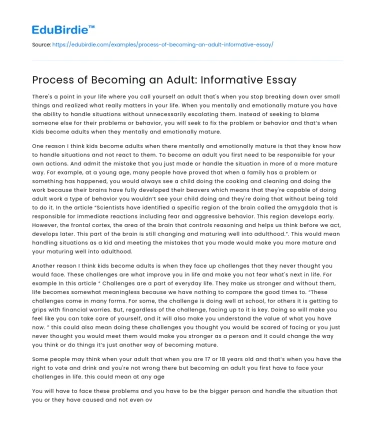Introduction
The transition from adolescence to adulthood is a complex and multifaceted journey that involves a variety of developmental tasks and milestones. This process is influenced by cultural, social, and individual factors, making it a unique experience for each person. In modern society, the pathway to adulthood is not as clearly defined as it once was, with traditional markers such as leaving home, completing education, starting a career, and establishing a family being achieved at different stages and in various orders. This essay aims to explore the process of becoming an adult, examining the psychological, social, and physical changes that occur during this period. By understanding these changes, we can better appreciate the challenges and opportunities that arise as individuals navigate the complexities of adult life.
Psychological Development and Identity Formation
One of the most critical aspects of becoming an adult is the development of a stable and coherent identity. According to Erik Erikson, a prominent developmental psychologist, the primary task of adolescence is to achieve a sense of identity, which continues to evolve into adulthood. This involves exploring different roles, values, and beliefs to develop a personal identity that aligns with one's sense of self. Research suggests that successful identity formation is associated with higher levels of well-being and life satisfaction. It is a process that requires introspection and reflection, as individuals evaluate their goals, aspirations, and values.
Save your time!
We can take care of your essay
- Proper editing and formatting
- Free revision, title page, and bibliography
- Flexible prices and money-back guarantee
In the context of today's rapidly changing world, the journey to identity formation is often complicated by external pressures and expectations. The rise of social media has introduced new dynamics in identity exploration, with individuals often curating and presenting idealized versions of themselves online. This can lead to a dissonance between one's online persona and real-life identity, complicating the process of achieving a genuine sense of self. Furthermore, cultural and societal norms play a significant role in shaping identity, with different societies valuing distinct traits and accomplishments. For example, in Western cultures, individualism and self-expression are often emphasized, whereas collectivist societies may prioritize community and familial roles.
Despite these challenges, the pursuit of a coherent identity remains a central theme in the transition to adulthood. As individuals navigate this journey, they must balance societal expectations with personal desires, ultimately striving to develop an authentic and fulfilling life path. This exploration is not without its difficulties, and it is essential to acknowledge the diverse ways individuals experience and express their identities.
Social Roles and Responsibilities
Another critical component of becoming an adult is the assumption of new social roles and responsibilities. This transition often involves significant changes in relationships, as individuals form new connections and redefine existing ones. The establishment of intimate partnerships, for example, is a hallmark of adult social development. According to Sternberg's triangular theory of love, adult relationships are characterized by varying combinations of intimacy, passion, and commitment, which evolve over time.
In addition to personal relationships, adulthood is marked by increased responsibilities in the workplace and community. As individuals enter the workforce, they are expected to demonstrate professionalism, reliability, and competence. This often requires the development of new skills and the ability to adapt to changing work environments. Moreover, adults are frequently called upon to contribute to their communities through volunteer work, civic engagement, or leadership roles. These responsibilities can be both rewarding and challenging, as they demand a balance between personal and professional commitments.
The transition to adulthood also involves renegotiating familial roles, as individuals may become parents, caregivers, or mentors. This shift in dynamics requires a re-examination of priorities and responsibilities, often leading to increased stress and pressure. However, it also offers opportunities for growth and fulfillment, as adults take on roles that contribute to the well-being of others and the community.
Physical and Biological Changes
While the psychological and social aspects of becoming an adult are significant, physical and biological changes also play a crucial role in this transition. The human brain continues to develop well into the mid-twenties, with the prefrontal cortex, responsible for decision-making and impulse control, being one of the last areas to mature. This ongoing development impacts cognitive abilities, emotional regulation, and risk assessment, which are essential for adult functioning.
In addition to brain development, adulthood is marked by changes in physical health and well-being. Metabolic rates typically decrease as individuals age, requiring adjustments in diet and exercise to maintain health. Additionally, adults may face increased health risks associated with lifestyle choices, such as smoking, alcohol consumption, and sedentary behavior. It is crucial for individuals to adopt healthy habits early in adulthood to prevent chronic conditions later in life.
Furthermore, the biological clock plays a significant role in adult life, particularly concerning fertility and reproductive health. Women, in particular, face pressures related to the timing of family planning and career advancement. These biological realities necessitate informed decision-making and access to healthcare resources to support individuals in achieving their personal and professional goals.
Conclusion
The journey to adulthood is a multifaceted process that encompasses psychological, social, and physical changes. Each individual's path is unique, shaped by personal experiences, cultural influences, and societal expectations. The challenges and opportunities encountered during this transition are integral to the development of a well-rounded and fulfilled adult. While the process of becoming an adult can be daunting, it is also a time of significant growth and self-discovery. By understanding the complexities of this journey, we can better support individuals as they navigate the challenges of adult life, fostering a society that values and nurtures the diverse experiences of adulthood.






 Stuck on your essay?
Stuck on your essay?

